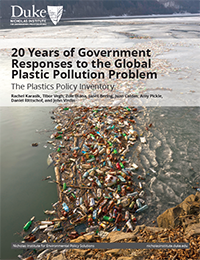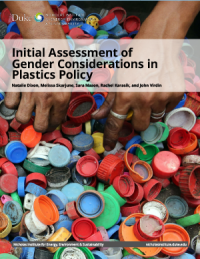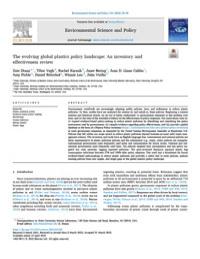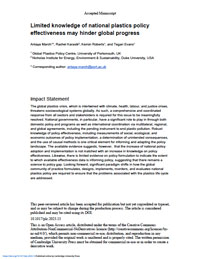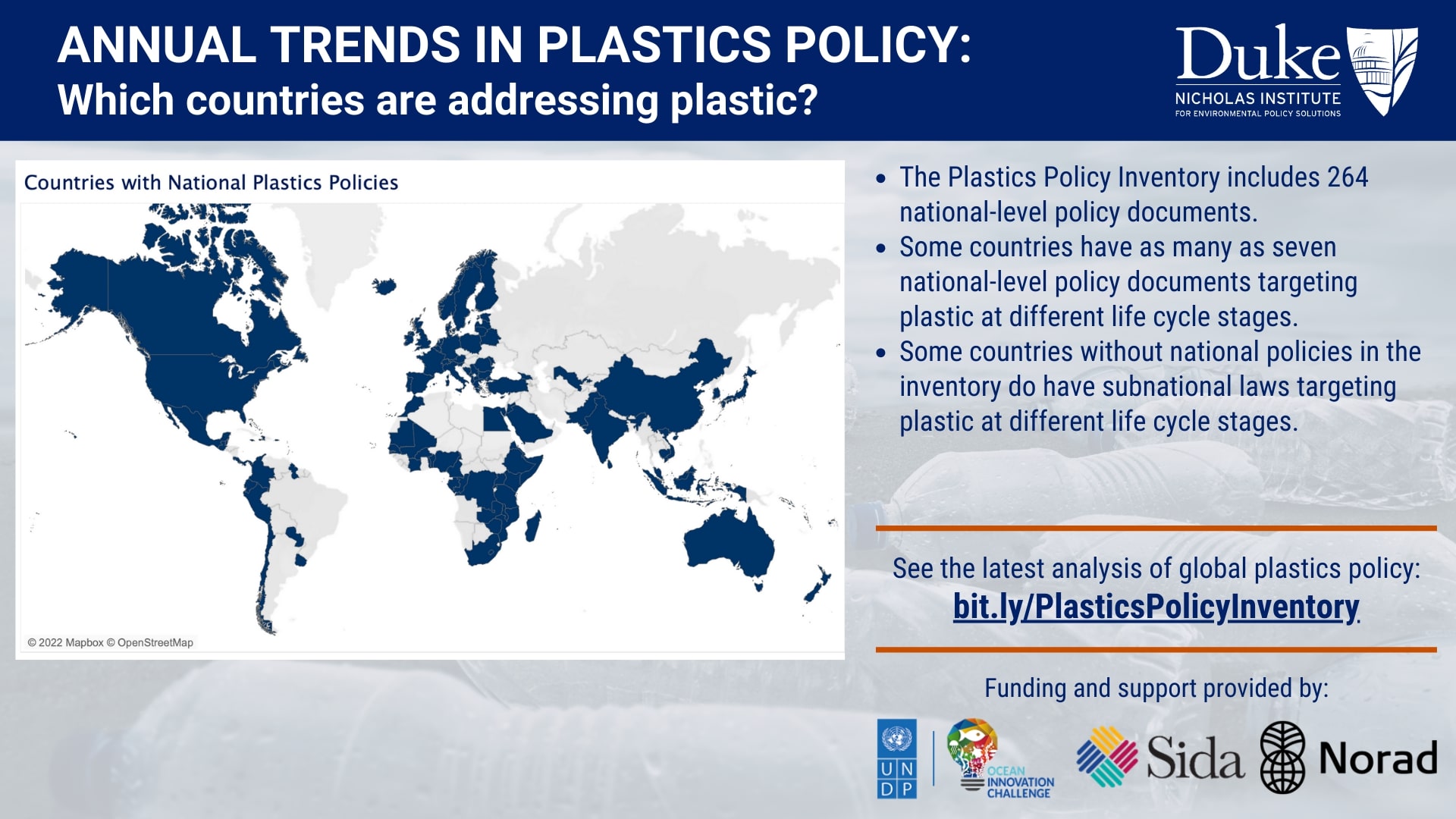Key Publications
20 Years of Government Responses to the Global Plastic Pollution Problem
Plastic pollution in the ocean is a global problem that requires cooperation from a wide range of groups (e.g., governments, producers, consumers, researchers, civil society). However, by virtue of their core regulatory powers, governments have a critical role to play in helping to solve this problem. This study aims to synthesize the policy response of governments to the global plastic pollution problem, as a basis for more rigorous monitoring of progress (as called for in Resolution 4/6 of the 2019 United Nations Environment Assembly (UNEA) meeting) and to inform future public policies.
2023 Annual Trends in Plastics Policy: A Brief
In the first annual update of Annual Trends in Plastics Policy, Nicholas Institute researchers find that plastics policy enactment continues to surge and was not negatively affected by the COVID-19 pandemic. In fact, researchers found more than 300 additional policies to index in the Plastics Policy Inventory, upon which this report is based, for a total of 894 policies. The 2022 update to the inventory increased the total by more than 50%.
However, gaps in scope and implementation remain. Though more policies address additional types of single-use plastics, most still target only plastic bags. Microplastics and marine sources remain relatively unaddressed, and economic instruments are a minority of policy instruments used.
To better gauge policy implementation, researchers established a new effectiveness policy library to accompany the 2022 update. These studies indicate that, while underused in existing policy, greater governmental use of economic instruments (e.g., taxes, fees, levies) and information instruments (e.g., awareness campaigns to communicate other instruments to the public, education initiatives, etc.) would aid in enacting effective policies in the future.
Annual Trends in Plastics Policy: A Brief
In 2020, the Plastics Policy Inventory and accompanying report, 20 Years of Government Responses to the Global Plastic Pollution Problem, were published, providing a baseline for the trends in government responses to the plastic pollution problem, as well as highlighting some gaps. Since that time, momentum has grown toward negotiation of an international agreement as a collective response to the problem, even as governments and resources have been strained by the ongoing coronavirus pandemic. This first brief builds upon the 2020 report and baseline by adding new data on national policy responses to plastic pollution from 2020 and 2021. Assessment of the more up-to-date policy inventory suggests that the twenty-year trend of an increase in the number of national policies introduced to reduce plastic pollution has stalled. While additional data on national policies may subsequently become available to revise these estimates, if confirmed they would suggest a pause in government responses to the problem, coinciding with the pandemic (though we cannot show causality). Our goal is for this brief to be the first in a regular series of annual updates on the trends in government responses to the global plastic pollution problem.
Initial Assessment of Gender Considerations in Plastics Policy
Globally, women are disproportionately burdened and impacted by the harmful effects of plastic across the life cycle of products. These burdens vary across cultural, socioeconomic, and political contexts, and based on how women engage with plastic, but broadly include health and safety impacts, access to opportunities in the waste sector, and exposures to harmful plastic-associated chemicals. This initial assessment considers how women, people who are assigned female at birth and have been socialized as females, and/or female-identified people are considered in plastics policy scope and implementation.
Researchers identified 25 documents at the intersection of plastics policy and gender, indicating gender is rarely considered when crafting plastics policy. However, evidence of gender-differentiated impacts of plastics policy is emerging. Plastics bans, waste management policies, and economic development funds often ignore or do not consider women’s roles as heads of households or informal waste sector workers, both of which expose women to excesses of plastics and their negative effects.
Despite this, some policies that do consider gender were identified. Most are primarily focused on incorporating women in the waste management sector and alleviating the burden of low-income women from complying with plastic bag fees. None address the risks associated with chemical exposure across the plastics life cycle.
These policies, alongside expert interviews, suggest that the path toward tangible consideration of gender-differentiated impacts associated with plastic and plastics policies requires, at a minimum, ensuring the inclusion of women in policymaking, waste management industries, and research and development. The reviewed literature emphasizes that only when power structures are reexamined and corrected for will there be meaningful changes to the ways humanity designs plastics, manages waste, and informs the public about the products they consume.
The Evolving Global Plastics Policy Landscape: an Inventory and Effectiveness Review
Governments worldwide are increasingly adopting public policies, laws, and ordinances to reduce plastic pollution. To date, studies have not analyzed the content of, and trends in, these policies. Employing a content analysis and literature search, we set out to better understand: (i) governments responses to this problem over time, and (ii) the state of the available evidence on the effectiveness of policy responses. Our motivations were to: (i) expand evidence-based policy-making to reduce plastic pollution by identifying and classifying the policy instruments used by governments; (ii) compile evidence regarding policy effectiveness; and (iii) provide a global database in the form of a Plastics Policy Inventory (https://nicholasinstitute.duke.edu/plastics-policy-inventory) to track government responses, as requested by the United Nations Environment Assembly in Resolution 4/6. Policies that fell within our scope aimed to reduce plastic pollution beyond business-as-usual solid waste management schema. This Inventory and study have an English-language bias. International and national policies are fairly representative of plastic pollution policies and the subnational (e.g., states, cities) policies are examples. International governments most frequently used plans and commitments for future action. National and subnational governments most frequently used bans. Ten policies targeted only microplastics and one policy targeted tire wear particles, lagging reported pollution. The peer-reviewed literature reported plastic bag consumption reductions between 27% and 100% after policy adoption. This work lays a foundation for future evidence-based policymaking to reduce plastic pollution and provides a useful tool to track policies, analyze existing policies from new angles, and target gaps in the global plastics policy landscape.
Limited Knowledge of National Plastics Policy Effectiveness May Hinder Global Progress
Policy effectiveness is a critical measure for assessing whether policies are working and determining necessary adjustments. However, understanding the effectiveness of plastic policies is a significant gap in the toolkit driving solutions to the plastics crisis. This review examines effectiveness evaluations and existing tools for assessing policy effectiveness.The review further identifies the barriers to understanding effectiveness before proposing ways forward. Most studies focus on plastic bag bans or taxes, neglecting other policy instruments. Additionally, these studies often employ simple attribution approaches, rather than causal inference methods, limiting our ability to determine the true impact of policies on desired outcomes. The lack of monitoring and evaluation of plastic policies further hampers knowledge acquisition. The global understanding of the plastics economy and measurable success metrics is insufficient, hindering the design of systemic interventions. These findings highlight the development and evaluation of plastic policies with limited information. A more nuanced understanding of effective plastic policies is necessary, including a harmonised approach to evaluations, a shared definition of effectiveness, the use of rapid assessment tools, and the integration of monitoring and evaluation into policy instruments.
Guidance and Methods
Methods for Conducting Country-Specific Plastic Pollution Policy Assessments: A How-To Guide
Building upon the above work, a research team from Duke Kunshan University, in China, adapted the methods used in the 2020 report to conduct a deeper dive of plastics policy documents at the national and subnational level in China (publication forthcoming). This brief aims to summarize the methods used in both the Global and China assessments and is written for researchers at any level to replicate these methods and tailor them for their country or countries of interest.
Plastics Policy Country Profiles

